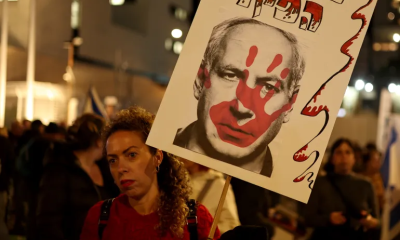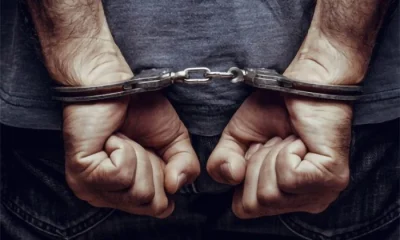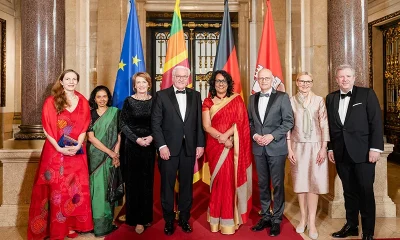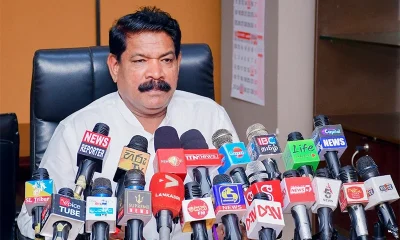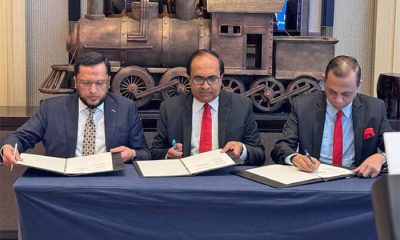Features
Beyond constitutional politics and polemics
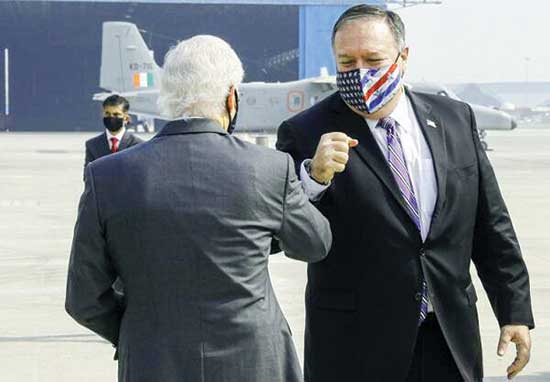
Secretary of State Mike Pompeo and US Ambassador to India Kenneth Juster greet one another upon Pompeo’s arrival at the airport in New Delhi on Monday. PTI
by Austin Fernando
All quandaries on constitutional amendments are now over with an impressive victory for President Gotabaya Rajapaksa, and the country looks forward to the implementation of the 20th Amendment (20A), to serve the people more efficiently, effectively, and economically.
Although Minister of Justice Ali Sabry declared that all 20A provisions had been in the JR Jayewardene Constitution previously, there were a few differences. Considering the volume of amendments, this stance is passable, though not exact. My observation is that Presidents Jayewardene, Ranasinghe Premadasa and Mahinda Rajapaksa performed effectively in comparison to attain their development objectives through the 1978 Constitution.
Governmental performance
Economic performance is an essential ingredient in political performance and management. It is because the economics of development under all regimes has been an evaluation yardstick and also publicly questioned.
Performance by Presidents, Prime Ministers and governments are not guided and determined only by Constitutions. If Constitutions could facilitate smooth performance, why didn’t it happen during tenures of all Presidents exercising power according to the 1978 Constitution? Until 2009, they had failed to defeat terrorism. Corruption increased. The economic morass continued.
The development of a country hinges on the quality of political and business leadership, national security/stability, research/ technological /educational standards, labour legislations, foreign direct investments, foreign assistance/aid, environmental soundness, diplomacy, international political behavior, and positive responses. The Constitution could boost development, but it alone is not sufficient.
Successes do not preclude criticisms that were aplenty against the aforesaid three Presidents. Some criticisms were even acceptable as regards the moral decadence due to the open economy, proliferation of dangerous drugs, or the construction of an unoptimizable port, airport and other such infrastructural projects and debt traps.
Human rights
One criterion for foreign assistance is a country’s respect for human rights. I may quote Rights watchdog Meenakshi Ganguly, of Human Rights Watch- South Asia, to prove this point. After the election of President Gotabaya Rajapaksa, she said: “The Sri Lankan government needs to hear that other countries are watching and will respond to renewed abuses.” This threat has not gone away.
Such issues will be taken up when the UNHRC meets in early 2021. Britain has already decided to withdraw the LTTE ban. Additionally, anti-China attitudes could lead to the harassment of Sri Lanka even indirectly. Contrarily, the Chinese have given assurances of bailing us out.
Even after the passage of 20A, President Gotabaya Rajapaksa cannot expect to be exempted from such attitudes, rules, and standards. I will highlight some immediate reactions experienced with selected internationals. The way foreign powers have responded to the incumbents after the presidential and parliamentary elections will be a guide to observe the trends.
India
Immediately after the presidential election, India showed up in Colombo. President Gotabaya Rajapaksa also positively responded and the traditional first destination visit was to Delhi. Former President Maithripala Sirisena also did so, followed by another for the second inauguration of PM Modi.
Such visits provide opportunities to evaluate silently how foreign powers respond. I had the privilege of participating in all three visits by Presidents Sirisena and Rajapaksa. President Sirisena’s first visit was considered by Indians as a grand opportunity for novel openings and approaches, having experienced a deterioration of diplomatic relations under President Mahinda Rajapaksa’s tenure.
However, the agreement signed by Ministers Malik Samarawickrama and Sushma Swaraj in 2017, concerning several large-scale projects, apparently to spite Chinese political/economic interference in Sri Lanka, did not reach fruition. Indians did not forgive the Sirisena-Wickremesinghe government although formal relations were maintained respectfully.
The difference in diplomatic relations is reflected in many ways. This was seen from how PM Modi responded when President Gotabaya Rajapaksa visited India in November 2019. Their one-on-one meeting lasted 55 minutes, and India offered US dollar 450 million to Sri Lanka in assistance. Perhaps, body chemistry of the two leaders clicked. PM Mahinda Rajapaksa once criticised Indians for having contributed to his defeat in 2015. India has proved that there are no permanent friends or permanent enemies in foreign relations, and it is only the mutual interests that matter.
Indians expected the fast-tracking of projects related to the Eastern Container Terminal (ECT), the Mattala Airport, and Trinco Petroleum Tanks. But there has been no positive follow-up even eleven months after President Gotabaya Rajapaksa’s discussions with PM Modi. The COVID-19 pandemic could be one reason for this delay. But a fresh dialogue is necessary if India is to be kept in the development loops.
Recently, PM Modi offered a $15-million grant for the promotion of Buddhist cultural exchanges, but his officers are slow in finalizing requests for a debt moratorium and an additional $1.1-billion assistance discussed during the visits of Rajapaksa brothers in November 2019 and February 2020. Positively, the Reserve Bank of India signed a swap of $400 million. If such needs are not met, the vacuum will be filled by another.
For comparison, Indian External Affairs Minister committed a 100-million-dollar grant and a project loan of 400 million dollars to the Maldives in mid-August this year, showing assistance did not depend on demography, revenue generation, or socio-economy, but on other priorities. The swift assistance to the Maldives and the delay in responding to our request may be conveying a message that should be heard and understood by Sri Lanka.
I quote another Indian investment in Bangladesh for comparison. The Bangladesh Economic Zones Authority was ready (mid-2020) to start site development for an Indian Special Economic Zone, where billions of dollars in investment were expected from India. Sri Lanka was not so fortunate even though such potential was in the 2017 agreement. The government must learn from Bangladesh experience.
China
Quite the opposite response was shown by the Chinese who have already handed over 500 million dollars (March 2020). When the Chinese Minister Wang Yi met Foreign Minister Dinesh Gunawardena, the latter thanked China for its consistent contribution to Sri Lanka’s development process as well as their support at numerous regional and international fora, like the UNHRC. China and Russia have been helpful throughout.
Chinese involvement in infrastructure development has drawn severe criticism. This is something common throughout the world as regards the Chinese investment through the Belt and Road Initiative (BRI).
Another Chinese intervention took place recently when Senior Chinese diplomat Yang Jiechi met President Gotabaya Rajapaksa, who reportedly said: “Sri Lanka will firmly commit itself to deepening friendship with China, and is willing to make every effort to press forward the key BRI cooperation projects such as the Colombo Port City and the comprehensive development of the Hambantota Harbour.” This would not have pleased the Indians and Americans, and even the Japanese, who recently lost a light rail investment project here.
When Yang met PM Mahinda Rajapaksa, just after the latter’s discussion with PM Modi, the PM thanked China’s support for combating COVID-19, adding that China’s strong support in various fields had helped Sri Lanka strengthen its capacity to resume work and production amid the pandemic.
Finally, it was revealed that China would also help mitigate the financial crisis faced by Sri Lanka.
The Framework of the Strategic Cooperative Partnership between China and Sri Lanka embarked on, in 2013, gave hope of advantages through development but achievements have been slow in coming. The recent high-level Chinese visit here points to a desire to accelerate it. It must be noted that such interventions with other countries (e. g. India) were slow. The delay between bureaucratic decision-making and politicized decision-making could be the reason.
USA, Quad, and influences
The incredibly positive relations build-up by Yang Jiechi is followed by US Secretary of State Mike Pompeo’s visit to Colombo. While arrangements were being made for Pompeo’s visit, the US announced that it would urge Sri Lanka “to make ‘difficult but necessary choices’ on its economic relations”. The reference to difficult economic relations invariably meant the partnering with China. The MCC is another project the US is interested in.
The US spokesperson made it abundantly clear, saying “We encourage Sri Lanka to review the options we offer for transparent and sustainable economic development in contrast to discriminatory and opaque practices.” Media reports show that this message was partially conveyed to several Ministers by the American Ambassador Toeplitz when she met them.
The Chinese Foreign Ministry dismissed the comments as a manifestation of the “Cold War mentality.” Its spokesman Zhao Lijian responded, “Attempts to use coercion to obstruct normal cooperation between countries will not succeed.”
Concurrently, Mike Pompeo has recently suggested (after the Tokyo Quad meeting) that the Quad should be institutionalized: “We [Quad members] can begin to build out a true security framework” for the Indo-Pacific. He also described the Quad as the “fabric” that could “counter the challenge that the Chinese Communist Party (CCP) presents to all of us.” It is clear Pompeo is gathering support against China.
In this context, meeting Pompeo after Yang Jiechi will be an embarrassment for Rajapaksas. In fact, a few months ago CCP was considered as a guide for their political party. Yet, the US will see whether Sri Lanka is prepared to counter the CCP challenges and to what extent. This is not surprising especially after India agreeing to sign a military agreement with the USfor sharing of sensitive satellite data and conducting a dialogue to counter China’s growing power in the region. It may be appropriate for Sri Lanka to remain cautious.
As commentators say, Chinese behaviour and attempts to re-order the region have caused concern among the Quad members. They believe that Quad may have to discuss a rule-based big picture of the Indo-Pacific Region, especially how to reshape China’s behaviour, and under what conditions they would reassess China as a responsible stakeholder. Pompeo is here after the Quad Foreign Ministers Meeting in Tokyo. Given this situation, how Sri Lanka should deal with him is a challenge.
Diplomatic conflicts and us
Countries like Sri Lanka sometimes become playing fields for powerful countries. US Ambassador Alaina Teplitz recently said that the US goal “in responding to this request (MCC) is to alleviate poverty and to boost inclusive economic growth” and identifying Sri Lanka as “a sovereign leader in maritime security”, which are indisputably favourable recognition of Sri Lanka.
But her statement “Sri Lanka should engage with China in ways that protect its sovereignty” angered China, which responded directly. The Chinese Embassy in Colombo stated that “with great shock and strong discontent, the embassy learned about the US Ambassador’s interview with a local newspaper, in which a foreign envoy from a third country openly played off China-Sri Lanka relations and severely violated the diplomatic protocol.” The Chinese are extraordinarily concerned with the US violating Sri Lanka’s diplomatic protocols. Having been a High Commissioner myself, I await such bold statements from our Ambassadors in the US or China, even violating diplomatic protocols, when a situation arises with these two governments! Am I waiting for Godot!
Further, the Chinese statement said: “Both China and Sri Lanka as independent countries have full right to develop relations with foreign countries according to our own need and will.” This reminds me of a past Chinese intervention in Bhutan. It is an example where the Chinese while seeking to mend relations with Bhutan, to make India lose ground, dropped Chinese tourist arrivals after the Doklam standoff, because Bhutan did not stand with China. It was a warning to Bhutan about the country’s vulnerability. At that point, the “full right to develop relations” with India was tabooed by China for Bhutan!
Bhutan’s obligations to act according to the Treaty of Friendship between India and Bhutan (8-8-1949) calling for peace between them and non-interference in each other’s internal affairs and the additional agreement by Bhutan to let India “guide” its foreign policy and consultative action on foreign and defense affairs were not considered by the Chinese, as the legal “need and will” of Bhutan.
Similarly, India’s wrath was unleashed (2012) when the then Bhutanese PM Jigme Thinley met the Chinese PM, Wen Jiabao, on the sidelines of the Rio+20 Summit. India retaliated by withdrawing fuel subsidies to Bhutan. New Delhi’s heavy-handed response was deeply resented by Bhutan.
We complain of powerful countries using the proverbial stick, but these examples show that anyone could be the perpetrator to satisfy his needs. Let us be realistic without resorting to rhetoric, which emanate from boisterous politicians mostly- even ministers.
The Chinese strongly suggested “the US quit the addiction of preaching others and applying double standards” and named four areas of misdeeds, i. e. slandering, pretending as the guardian of free trade while violating the WTO rulings, holding high the banner of transparency, and smearing others’ normal cooperation against sovereignty, while militarily misbehaving and imposing unilateral sanctions. Brunei, Vietnam, Malaysia, Philippines or Taiwanese in China Sea or Indians in Ladakh may blame the Chinese for not adhering to some of these principled behaviours and preaching to the US. Can Sri Lanka challenge President Xi on the same lines?
Conclusion
I quoted the aforesaid references to point out the difficulties faced by Sri Lanka in the big diplomatic picture. They are thrust on us. Sri Lanka must take informed positions due to practicalities.
With the Indians, the proximity, centuries old relationships, strategic location in the Indian Ocean region, which became a focused area due to Indo-Pacific Regional bias, India and Japan, etc., must be valued. The busines alliances between India and Japan on ECT and Liquified Natural Gas projects send another message. The potential/ possible Indian influence on other countries, some parliamentarians, demographic and political groups must be considered for internal political stability purposes.
The Chinese factor must be considered in the light of past transactions and potential investments that could be received faster than from borrowing agencies or formal lenders. Sri Lanka’s economic problems need immediate solutions. How far could the government wait for external interventions satisfying all criteria?
The above quoted financial requirements and responses received from India may help understand the reality of financing, for which China responds faster than any other country. Any political intervention should address this problem and adapt to systemic assistance. Of course, the disadvantages of Chinese interventions, even highlighted by the World Bank study, about procurement procedures could push countries like Sri Lanka into difficulties. What alternatives could evolve is an issue.
Immediate response to the statement by Dean Thompson was experienced with Sri Lanka’s government bonds falling heavily last week. This is the danger that could be created by big brothers. The African proverb, ‘When elephants fight, it is the grass that suffers’, is always valid.
It is time for those who yelled last week that restrictions on stability/development could be remedied by constitutional amendments to keep quiet because it is not the absolute truth. The 20A had other objectives as is obvious. They should look afresh realistically and consider whether ignoring the international developments is possible. Let saner counsel prevail.
Simply stated, it is time to ditch camouflaged rhetoric heard in the House last week and look incisively, realistically, logically, and face the international challenges caused by the financial crisis, COVID 19, political conflicts, etc. Being a small nation, we need everyone’s support.
Features
Inescapable need to deal with the past
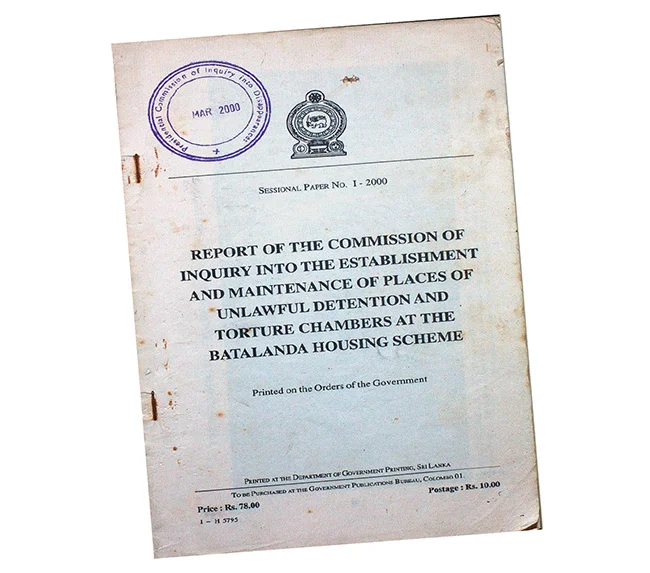
by Jehan Perera
The sudden reemergence of two major incidents from the past, that had become peripheral to the concerns of people today, has jolted the national polity and come to its centre stage. These are the interview by former president Ranil Wickremesinghe with the Al Jazeera television station that elicited the Batalanda issue and now the sanctioning of three former military commanders of the Sri Lankan armed forces and an LTTE commander, who switched sides and joined the government. The key lesson that these two incidents give is that allegations of mass crimes, whether they arise nationally or internationally, have to be dealt with at some time or the other. If they are not, they continue to fester beneath the surface until they rise again in a most unexpected way and when they may be more difficult to deal with.
In the case of the Batalanda interrogation site, the sudden reemergence of issues that seemed buried in the past has given rise to conjecture. The Batalanda issue, which goes back 37 years, was never totally off the radar. But after the last of the commission reports of the JVP period had been published over two decades ago, this matter was no longer at the forefront of public consciousness. Most of those in the younger generations who were too young to know what happened at that time, or born afterwards, would scarcely have any idea of what happened at Batalanda. But once the issue of human rights violations surfaced on Al Jazeera television they have come to occupy centre stage. From the day the former president gave his fateful interview there are commentaries on it both in the mainstream media and on social media.
There seems to be a sustained effort to keep the issue alive. The issues of Batalanda provide good fodder to politicians who are campaigning for election at the forthcoming Local Government elections on May 6. It is notable that the publicity on what transpired at Batalanda provides a way in which the outcome of the forthcoming local government elections in the worst affected parts of the country may be swayed. The problem is that the main contesting political parties are liable to be accused of participation in the JVP insurrection or its suppression or both. This may account for the widening of the scope of the allegations to include other sites such as Matale.
POLITICAL IMPERATIVES
The emergence at this time of the human rights violations and war crimes that took place during the LTTE war have their own political reasons, though these are external. The pursuit of truth and accountability must be universal and free from political motivations. Justice cannot be applied selectively. While human rights violations and war crimes call for universal standards that are applicable to all including those being committed at this time in Gaza and Ukraine, political imperatives influence what is surfaced. The sanctioning of the four military commanders by the UK government has been justified by the UK government minister concerned as being the fulfilment of an election pledge that he had made to his constituents. It is notable that the countries at the forefront of justice for Sri Lanka have large Tamil Diasporas that act as vote banks. It usually takes long time to prosecute human rights violations internationally whether it be in South America or East Timor and diasporas have the staying power and resources to keep going on.
In its response to the sanctions placed on the military commanders, the government’s position is that such unilateral decisions by foreign government are not helpful and complicate the task of national reconciliation. It has faced criticism for its restrained response, with some expecting a more forceful rebuttal against the international community. However, the NPP government is not the first to have had to face such problems. The sanctioning of military commanders and even of former presidents has taken place during the periods of previous governments. One of the former commanders who has been sanctioned by the UK government at this time was also sanctioned by the US government in 2020. This was followed by the Canadian government which sanctioned two former presidents in 2023. Neither of the two governments in power at that time took visibly stronger stands.
In addition, resolutions on Sri Lanka have been a regular occurrence and have been passed over the Sri Lankan government’s opposition since 2012. Apart from the very first vote that took place in 2009 when the government promised to take necessary action to deal with the human rights violations of the past, and won that vote, the government has lost every succeeding vote with the margins of defeat becoming bigger and bigger. This process has now culminated in an evidence gathering unit being set up in Geneva to collect evidence of human rights violations in Sri Lanka that is on offer to international governments to use. This is not a safe situation for Sri Lankan leaders to be in as they can be taken before international courts in foreign countries. It is important for Sri Lanka’s sovereignty and dignity as a country that this trend comes to an end.
COMPREHENSIVE SOLUTION
A peaceful future for Sri Lanka requires a multi-dimensional approach that addresses the root causes of conflict while fostering reconciliation, justice, and inclusive development. So far the government’s response to the international pressures is to indicate that it will strengthen the internal mechanisms already in place like the Office on Missing Persons and in addition to set up a truth and reconciliation commission. The difficulty that the government will face is to obtain a national consensus behind this truth and reconciliation commission. Tamil parties and victims’ groups in particular have voiced scepticism about the value of this mechanism. They have seen commissions come and commissions go. Sinhalese nationalist parties are also highly critical of the need for such commissions. As the Nawaz Commission appointed to identify the recommendations of previous commissions observed, “Our island nation has had a surfeit of commissions. Many witnesses who testified before this commission narrated their disappointment of going before previous commissions and achieving nothing in return.”
Former minister Prof G L Peiris has written a detailed critique of the proposed truth and reconciliation law that the previous government prepared but did not present to parliament.
In his critique, Prof Peiris had drawn from the South African truth and reconciliation commission which is the best known and most thoroughly implemented one in the world. He points out that the South African commission had a mandate to cover the entire country and not only some parts of it like the Sri Lankan law proposes. The need for a Sri Lankan truth and reconciliation commission to cover the entire country and not only the north and east is clear in the reemergence of the Batalanda issue. Serious human rights violations have occurred in all parts of the country, and to those from all ethnic and religious communities, and not only in the north and east.
Dealing with the past can only be successful in the context of a “system change” in which there is mutual agreement about the future. The longer this is delayed, the more scepticism will grow among victims and the broader public about the government’s commitment to a solution. The important feature of the South African commission was that it was part of a larger political process aimed to build national consensus through a long and strenuous process of consultations. The ultimate goal of the South African reconciliation process was a comprehensive political settlement that included power-sharing between racial groups and accountability measures that facilitated healing for all sides. If Sri Lanka is to achieve genuine reconciliation, it is necessary to learn from these experiences and take decisive steps to address past injustices in a manner that fosters lasting national unity. A peaceful Sri Lanka is possible if the government, opposition and people commit to truth, justice and inclusivity.
Features
Unleashing Minds: From oppression to liberation
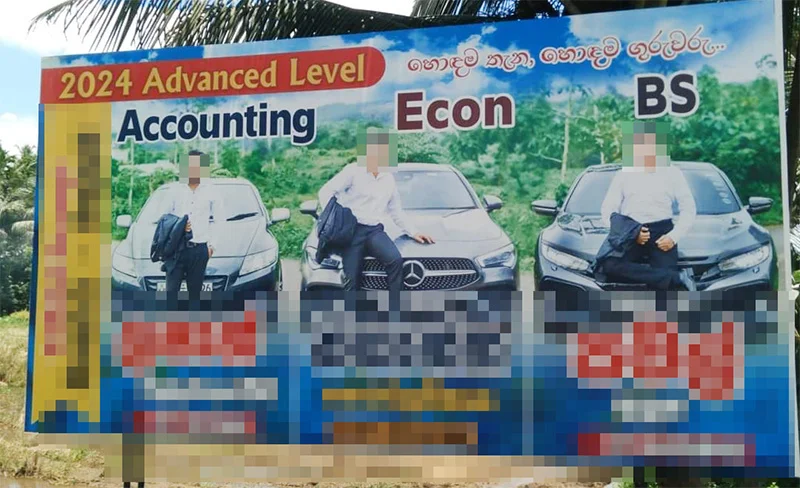
By Anushka Kahandagamage
 Education should be genuinely ‘free’—not just in the sense of being free from privatisation, but also in a way that empowers students by freeing them from oppressive structures. It should provide them with the knowledge and tools necessary to think critically, question the status quo, and ultimately liberate themselves from oppressive systems.
Education should be genuinely ‘free’—not just in the sense of being free from privatisation, but also in a way that empowers students by freeing them from oppressive structures. It should provide them with the knowledge and tools necessary to think critically, question the status quo, and ultimately liberate themselves from oppressive systems.
Education as an oppressive structure
Education should empower students to think critically, challenge oppression, and envision a more just and equal world. However, in its current state, education often operates as a mechanism of oppression rather than liberation. Instead of fostering independent thinking and change, the education system tends to reinforce the existing power dynamics and social hierarchies. It often upholds the status quo by teaching conformity and compliance rather than critical inquiry and transformation. This results in the reproduction of various inequalities, including economic, racial, and social disparities, further entrenching divisions within society. As a result, instead of being a force for personal and societal empowerment, education inadvertently perpetuates the very systems that contribute to injustice and inequality.
Education sustaining the class structure
Due to the widespread privatisation of education, the system continues to reinforce and sustain existing class structures. Private tuition centres, private schools, and institutions offering degree programmes for a fee all play a significant role in deepening the disparities between different social classes. These private entities often cater to the more affluent segments of society, granting them access to superior education and resources. In contrast, students from less privileged backgrounds are left with fewer opportunities and limited access to quality education, exacerbating the divide between the wealthy and the underprivileged. This growing gap in educational access not only limits social mobility but also perpetuates a cycle where the privileged continue to secure better opportunities while the less fortunate struggle to break free from the constraints of their socio-economic status.
Gender Oppression
Education subtly perpetuates gender oppression in society by reinforcing stereotypes, promoting gender insensitivity, and failing to create a gender-sensitive education system. And some of the policymakers do perpetuate this gender insensitive education by misinforming people. In a recent press conference, one of the former members of Parliament, Wimal Weerawansa, accused gender studies of spreading a ‘disease’ among students. In the year 2025, we are still hearing such absurdities discouraging gender studies. It is troubling and perplexing to hear such outdated and regressive views being voiced by public figures, particularly at a time when societies, worldwide, are increasingly embracing diversity and inclusion. These comments not only undermine the importance of gender studies as an academic field but also reinforce harmful stereotypes that marginalise individuals who do not fit into traditional gender roles. As we move forward in an era of greater social progress, such antiquated views only serve to hinder the ongoing work of fostering equality and understanding for all people, regardless of gender identity.
Students, whether in schools or universities, are often immersed in an educational discourse where gender is treated as something external, rather than an essential aspect of their everyday lives. In this framework, gender is framed as a concern primarily for “non-males,” which marginalises the broader societal impact of gender issues. This perspective fails to recognise that gender dynamics affect everyone, regardless of their gender identity, and that understanding and addressing gender inequality is crucial for all individuals in society.
A poignant example of this issue can be seen in the recent troubling case of sexual abuse involving a medical doctor. The public discussion surrounding the incident, particularly the media’s decision to disclose the victim’s confidential statement, is deeply concerning. This lack of respect for privacy and sensitivity highlights the pervasive disregard for gender issues in society.
What makes this situation even more alarming is that such media behaviour is not an isolated incident, but rather reflects a broader pattern in a society where gender sensitivity is often dismissed or ignored. In many circles, advocating for gender equality and sensitivity is stigmatised, and is even seen as a ‘disease’ or a disruptive force to the status quo. This attitude contributes to a culture where harmful gender stereotypes persist, and where important conversations about gender equity are sidelined or distorted. Ultimately, this reflects the deeper societal need for an education system that is more attuned to gender sensitivity, recognising its critical role in shaping the world students will inherit and navigate.
To break free from these gender hierarchies there should be, among other things, a gender sensitive education system, which does not limit gender studies to a semester or a mere subject.
Ragging
The inequality that persists in class and regional power structures (Colombo and non-Colombo division) creeps into universities. While ragging is popularly seen as an act of integrating freshers into the system, its roots lie in the deeply divided class and ethno-religious divisions within society.
In certain faculties, senior students may ask junior female students to wear certain fabrics typically worn at home (cheetta dresses) and braid their hair into two plaits, while male students are required to wear white, long-sleeved shirts without belts. Both men and women must wear bathroom slippers. These actions are framed as efforts to make everyone equal, free from class divisions. However, these gendered and ethicised practices stem from unequal and oppressive class structures in society and are gradually infiltrating university culture as mechanisms of oppression.The inequality that persists in gradually makes its way into academic institutions, particularly universities.
These practices are ostensibly intended to create a sense of uniformity and equality among students, removing visible markers of class distinction. However, what is overlooked is that these actions stem from deeply ingrained and unequal social structures that are inherently oppressive. Instead of fostering equality, they reinforce a system where hierarchical power dynamics in the society—rooted in class, gender, and region—are confronted with oppression and violence which is embedded in ragging, creating another system of oppression.
Uncritical Students
In Sri Lanka, and in many other countries across the region, it is common for university students to address their lecturers as ‘Sir’ and ‘Madam.’ This practice is not just a matter of politeness, but rather a reflection of deeply ingrained societal norms that date back to the feudal and colonial eras. The use of these titles reinforces a hierarchical structure within the educational system, where authority is unquestioned, and students are expected to show deference to their professors.
Historically, during colonial rule, the education system was structured around European models, which often emphasised rigid social distinctions and the authority of those in power. The titles ‘Sir’ and ‘Madam’ served to uphold this structure, positioning lecturers as figures of authority who were to be respected and rarely challenged. Even after the end of colonial rule, these practices continued to permeate the education system, becoming normalised as part of the culture.
This practice perpetuates a culture of obedience and respect for authority that discourages critical thinking and active questioning. In this context, students are conditioned to see their lecturers as figures of unquestionable authority, discouraging dialogue, dissent, or challenging the status quo. This hierarchical dynamic can limit intellectual growth and discourage students from engaging in open, critical discussions that could lead to progressive change within both academia and society at large.
Unleashing minds
The transformation of these structures lies in the hands of multiple parties, including academics, students, society, and policymakers. Policymakers must create and enforce policies that discourage the privatisation of education, ensure equal access for all students, regardless of class dynamics, gender, etc. Education should be regarded as a fundamental right, not a privilege available only to a select few. Such policies should also actively promote gender equality and inclusivity, addressing the barriers that prevent women, LGBTQ+ individuals, and other marginalised genders from accessing and succeeding in education. Practices that perpetuate gender inequality, such as sexism, discrimination, or gender-based violence, need to be addressed head-on. Institutions must prioritise gender studies and sensitivity training to cultivate an environment of respect and understanding, where all students, regardless of gender, feel safe and valued.
At the same time, the micro-ecosystems of hierarchy within institutions—such as maintaining outdated power structures and social divisions—must be thoroughly examined and challenged. Universities must foster environments where critical thinking, mutual respect, and inclusivity—across both class and gender—are prioritised. By creating spaces where all minds can flourish, free from the constraints of entrenched hierarchies, we can build a more equitable and intellectually vibrant educational system—one that truly unleashes the potential of all students, regardless of their social background.
(Anushka Kahandagamage is the General Secretary of the Colombo Institute for Human Sciences)
Kuppi is a politics and pedagogy happening on the margins of the lecture hall that parodies, subverts, and simultaneously reaffirms social hierarchies.
Features
New vision for bassist Benjy
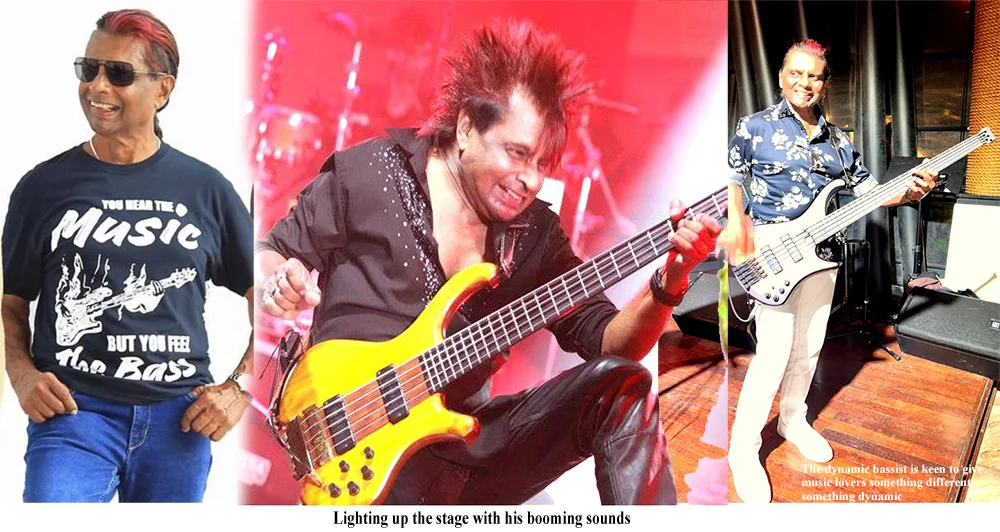
It’s a known fact that whenever bassist Benjy Ranabahu booms into action he literally lights up the stage, and the exciting news I have for music lovers, this week, is that Benjy is coming up with a new vision.
One thought that this exciting bassist may give the music scene a layoff, after his return from the Seychelles early this year.
At that point in time, he indicated to us that he hasn’t quit the music scene, but that he would like to take a break from the showbiz setup.
“I’m taking things easy at the moment…just need to relax and then decide what my future plans would be,” he said.
However, the good news is that Benjy’s future plans would materialise sooner than one thought.
Yes, Benjy is putting together his own band, with a vision to give music lovers something different, something dynamic.
He has already got the lineup to do the needful, he says, and the guys are now working on their repertoire.
The five-piece lineup will include lead, rhythm, bass, keyboards and drums and the plus factor, said Benjy, is that they all sing.
A female vocalist has also been added to this setup, said Benjy.
“She is relatively new to the scene, but with a trained voice, and that means we have something new to offer music lovers.”
The setup met last week and had a frank discussion on how they intend taking on the music scene and everyone seems excited to get on stage and do the needful, Benjy added.
Benjy went on to say that they are now spending their time rehearsing as they are very keen to gel as a team, because their skills and personalities fit together well.
“The guys I’ve got are all extremely talented and skillful in their profession and they have been around for quite a while, performing as professionals, both here and abroad.”
Benjy himself has performed with several top bands in the past and also had his own band – Aquarius.
Aquarius had quite a few foreign contracts, as well, performing in Europe and in the Middle East, and Benjy is now ready to do it again!
-

 Sports2 days ago
Sports2 days agoSri Lanka’s eternal search for the elusive all-rounder
-

 Features6 days ago
Features6 days agoCelebrating 25 Years of Excellence: The Silver Jubilee of SLIIT – PART I
-

 Business6 days ago
Business6 days agoCEB calls for proposals to develop two 50MW wind farm facilities in Mullikulam
-

 News3 days ago
News3 days agoGnanasara Thera urged to reveal masterminds behind Easter Sunday terror attacks
-

 Business4 days ago
Business4 days agoAIA Higher Education Scholarships Programme celebrating 30-year journey
-

 Features6 days ago
Features6 days agoNotes from AKD’s Textbook
-

 News2 days ago
News2 days agoComBank crowned Global Finance Best SME Bank in Sri Lanka for 3rd successive year
-

 Features2 days ago
Features2 days agoSanctions by The Unpunished





